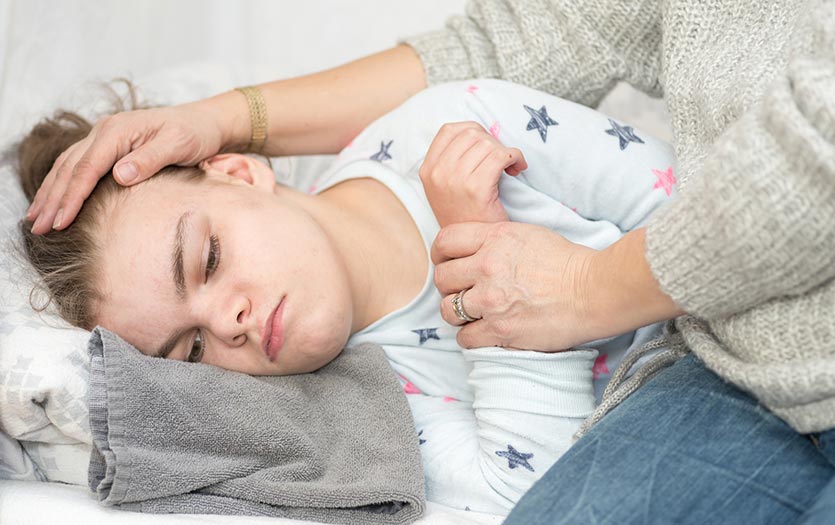A spinal cord injury, also called an SCI, is damage to the spinal cord that results in sudden decrease in movement. The spinal cord is a soft bundle of nerves that goes from the base of the brain to the lower back. It runs through the spinal canal, a tunnel formed by openings in the bones of the spine. The bony spine helps protect the spinal cord.
The spinal cord carries messages between the brain and the rest of the body. This allows you to move and to feel touch, among other things. Injury to the spinal cord stops the flow of messages below the site of the injury.
The closer the injury is to the brain, the more of the body that is affected.
Injury to the middle of the back usually affects the legs. This is called paraplegia.
Injury to the neck can affect the arms, chest and legs. This is called quadriplegia.
Types of spinal cord injuries
A spinal cord injury may be complete or incomplete. A person with a complete injury doesn't have any feeling or movement below the level of the injury. In an incomplete injury, the person still has some feeling or movement in the affected area.
What parts of the body are affected?
The nerves around a vertebra control specific parts of the body. Paralysis occurs in the areas of the body that are controlled by the nerves associated with the damaged vertebra, as well as the nerves below the damaged vertebra.
The spinal cord is surrounded by protective rings of bone called vertebrae. The vertebrae and spinal nerves are organized into segments, starting at the top of the spinal cord. Within each segment, the vertebrae and nerves are numbered. The segments are as follows:
Cervical
The neck area contains seven cervical vertebrae (C1 through C7) and eight cervical nerves (C1 through C8). Cervical spinal cord injuries (SCIs) usually cause loss of function in the chest, arms and legs. Cervical injuries can also affect breathing and bowel and bladder control.
Thoracic
The chest contains 12 thoracic vertebrae (T1 through T12) and 12 thoracic nerves (T1 through T12). The first thoracic vertebra, T1, is where the top rib attaches to the spine. Thoracic SCIs usually affect the chest and the legs. Injuries to the upper thoracic area can affect breathing. Thoracic injuries can also affect bowel and bladder control.
Lumbar
The lumbar area (between the chest area and the pelvis) contains five lumbar vertebrae (L1 through L5) and 5 lumbar nerves (L1 through L5). Lumbar SCIs usually affect the hips and legs. Lumbar injuries can also affect bowel and bladder control.
Sacral
The sacral area (from the pelvis to the end of the spine) contains five sacral vertebrae (S1 through S5) and five sacral nerves (S1 through S5). Sacral SCIs usually affect the hips and legs. Injuries to the upper sacral area can also affect bowel and bladder control.
How are spinal cord injuries diagnosed?
To determine the extent of a spinal cord injury, your physician may order a CT scan (computed tomography scan) and an MRI (magnetic resonance imaging). In addition, you will be tested to see how you respond to pinpricks and light touch to areas of your body. The doctor will ask you to move different parts of your body and test the strength of your muscles.
Together, these tests help the doctor identify the severity of the injury and how likely it is that you could get back some feeling and movement.
Life after a spinal cord injury
How can you plan for the future when you have a spinal cord injury? Today, with improved medical care and support, the outlook for people with a spinal cord injury is better than ever. In many cases, one year after the injury, life expectancy is close to that of a person without a spinal cord injury.
What to expect after a spinal cord injury
If treated within the hospital setting, steps will be taken to get your blood pressure stable and help you breathe. You may also get a steroid medicine to reduce swelling of the spinal cord.
As soon as you are stable, a person with spinal cord injury is typically referred for rehabilitation (rehab). The goal of rehab is to prevent more damage to the spine and spinal cord, to help prepare you for life after rehab and help you be as independent as possible. What happens in rehab depends on your level of injury.
Regaining strength and flexibility is critical to increasing your mobility and the ability to complete everyday tasks. In rehab, your therapist will help you learn to safely complete such tasks as:
- Transferring to and from a wheelchair
- Preventing pressure injuries
- Improving mobility and getting some form of physical activity such as passive stretching
Your therapist can also assist with:
- Adapting your home for your current abilities
- Managing your bladder and bowel
- Preventing lung problems with proper seated positioning
Join Parkview's spinal cord injury support group
Many individuals with spinal cord injuries find it helpful to participate in a support group with others who have had similar experiences. Parkview’s support group for those with spinal cord injuries meets on the last Monday of each month. Search our calendar of events for meeting dates or contact group facilitator, Elizabeth.Guevara@parkview.com.
When to call about spinal cord injury symptoms
- You have frequent coughing periods.
- You feel like you are choking or have problems swallowing.
- You have trouble breathing.
- You have fallen.
- You have a fever.
If you have questions about your neurological health or need expert care for a spinal cord injury, the Parkview neuroscience team can help. Ask your primary care physician if a referral would be appropriate for you.
For more information, call 260-217-4379.


